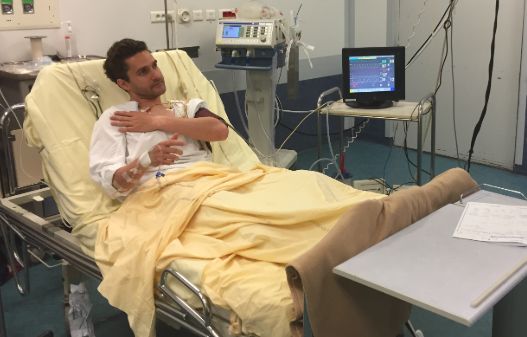At 57, actor Marc Faget has walked the stages of numerous stages in Toulouse. And the “unquestionably the richest, the most fabulous” role that he has taken on, very often, for eight years is that of the imaginary patient. Except that it has nothing to do with Molière. The artist is an expert level “simulated patient”. He is capable, fourteen times in the same day, of pretending, without ever changing and “as sincerely as possible”, of being overcome by a throbbing pain in the lower back or of accepting, incredulous, the announcement of a metastasized cancer.
He receives his scenarios and the schedule of his appearances from the Toulouse Institute of Health Simulation (Itsims). Inspired by Canadian and Swiss pioneers, the establishment has been calling on actors for the training of medical students for eight years, starting from the fourth year. “We do it to train them to announce bad news, a complication, in order to judge their reaction, their ability to seek information and interact with the patient,” explains Professor Thomas Geeraerts, the director of the institute. Although the exercise is “expensive”, the actors being paid by the hour like any faculty speaker, the practitioner is convinced that the process is much more effective than a PowerPoint, or a rehashed instruction in progress. “On an educational level, it is extremely efficient and productive as a technique,” he says. The students retain much better because the fact of immersing themselves with an actor will generate emotions in the student” All the more memorable when the patient balks and a “Calm down!” » has the exact opposite effect on him.
A large casting for the spring practical exams
And the proof that the “simulated patient” is becoming popular is that it is now integrated into the practical exam of all medical students who are preparing to choose their internship. At the end of May, for two days, thousands of riflemen will have to pass through a door ten times without knowing what will await them behind. Sometimes a mannequin to examine, sometimes analysis results to interpret, and then, without fail, an imaginary bedridden patient. That it will be necessary to reassure, inform or enlighten while two examiners observe the scene in front of screens or behind one-way glass. They will assess the candidate’s “relational skills”, their ability to adapt to the patient’s profile, “not to react like a robot”.
The fairness to be respected and the simultaneity of the tests are leading to an unprecedented wave of recruitment of simulated patients. Itsims of Toulouse has just launched its “casting” to find a hundred. “Women, men, young or old, we need a wide range of profiles because the exam scenario will be drawn at random and kept secret.” The fake patients, selected in particular “for their naivety in the medical field”, will be trained for two days in several different situations. Not sure that they will actually be called, two or three weeks later, to play a key role in examining future doctors. “But they will have had an original experience, contributed to the education of our future doctors and put a foot in the circuit,” underlines the director of Itsims.
Increasingly “difficult” roles
Because they may also be required to play “a simulated caregiver or relative” for much more “difficult” situations with which the Toulouse establishment sometimes confronts its interns or senior doctors.
Last week Marc Faget spent a whole day learning about the sudden death of a parent and not being easily convinced to donate his organs. It was much less fun than playing in the theater “but absolutely fascinating,” says the man who is also now a trainer of simulated patients. Conquered “by the natural empathy” that most doctors show whatever the situation, the actor considers playing only this single role. Itsims will need him and his expert colleagues in particular as part of a major study which will measure the impact of these “simulator actors” on the most difficult announcement of all: the unexpected death of a loved one, which can lead to pathological mourning.

